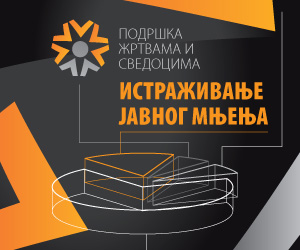The rights of victims and witnesses in the Republic of Serbia stem from its dedication to be a humane, democratic society which acts in accordance with the highest international standards in respecting human rights. In that sense, they do not only pertain to the criminal procedure, but also should be enjoyed from the moment a crime happened, as well as during the criminal procedure and after its completion.
Information, help and support for victims and witnesses are segments of rights which need to be ensured not just by public authorities and institutions, the judiciary and the non-governmental sector, but by the entire society.
The rights of a victim (injured party) in criminal proceedings in the Republic of Serbia are regulated by the Criminal Procedure Code (Article 50), and informing the victim about these rights is a legal obligation of public prosecutors and judges.
CRIMINAL PROCEDURE CODE
Rights of the Injured Party
Article 50
The injured party is entitled to:
1) submit a motion and evidence for realising a restitution claim and a motion for interim measures for securing it;
2) present facts and propose evidence of importance for proving the claim;
3) retain a proxy from amongst attorneys;
4) examine the files and objects serving as evidence;
5) be notified about the dismissal of a criminal complaint or abandonment of criminal prosecution by the public prosecutor;
6) submit objections to the public prosecutor’s decision not to conduct criminal prosecution or to abandon criminal prosecution;
7) be advised about the possibility of assuming criminal prosecution and representing the prosecution;
8) attend the preparatory hearing;
9) attend the trial and participate in examining evidence;
10) file an appeal against the decision on the costs of the criminal proceedings and the adjudicated restitution claim;
11) be notified about the outcome of the proceedings and be served the final judgment;
12) perform other actions where provided for by this Code. The injured party may be denied the right to examine the case files and objects until he is questioned as a witness. The public prosecutor and the court will inform the injured party of the rights referred to in paragraph 1 of this Article.
The injured party may be denied the right to examine the case files and objects until he is questioned as a witness. The public prosecutor and the court will inform the injured party of the rights referred to in paragraph 1 of this Article.
Serbia is a signatory of all of the most relevant international acts in this field, and it also expresses its dedication to improve the rights of victims through continued improvement of legislation, with the aim to develop a comprehensive victim support system, and, as a country which is in the process of EU accession, gradually adjust its legislation to Directive 2012/29 establishing minimum standards on the rights, support and protection of victims of crime.
Crime harms society and represents a violation of individual rights.
Victims of crimes need to be recognised and treated with respect, empathy and in a professional manner, without discrimination on any basis.
The personal situation and the direct needs of a victim of a crime need to be taken into account along with full respect of their physical, mental and moral integrity.
Victims of crimes need to be provided with protection from secondary and repeat victimisation, intimidation and retaliation
Victims have a right to help and support which will contribute to their recovery, and to have adequate access to justice.
Principles laid down in Directive 2012/29/EU
establishing minimum standards on the rights,
support and protection of victims of crimes
Directive 2012/29/EU, as the minimum rights for victims and witnesses, defines:
RIGHT OF VICTIM DURING FIRST CONTACT
WITH COMPETENT AUTHORITIES OR SUPPORT SERVICES
The right to receive information, to understand and be understood – communication needs to be carried out in a simple and easily understandable language, with respect to the victim’s personal characteristics, and as early as first contact and without undue delay, the victims of crimes shall receive information about:
- the type of help they can receive (medical, professional and psychological support, alternative accommodation) and whom they can receive it from (including various state authorities and institutions, victim support services in the judiciary and non-governmental organisations)
- the manner of pressing charges
- potential protection (including protective measures)
- legal support (providing general legal information, form filling, mediation in resolution of disputes and compiling documents for the public notary) and legal aid (legal advice, drafting of submissions, representation and defence)
- compensation
- right to use of own language in the criminal procedure, the right to translation and interpretation and translation and interpretation services
- contacts for communication with regard to the case
- existing restorative justice services (amicable resolution of disputes)
- possible compensation of costs related to participation in the criminal proceedings
- special measures, procedures and mechanisms for protection of non-resident victims (for victims who do not have residence in the country where the crime was committed)
Along with other rights, the victim has a right to information and support if proceedings are initiated before the court, as well as afterwards.
RIGHTS OF VICTIMS IN THE EVENT OF PRESSING CHARGES
- The right to receive written confirmation about the formally submitted charges which shall contain the basic elements of the crime.
RIGHTS OF VICTIMS IN THE EVENT OF AN INITIATION OF CRIMINAL PROCEEDINGS
- Right to receive information about the case
- Right to translation and interpretation
- Right to access to victim support services and to the support of those services
- Right to be heard and to provide evidence
- Rights in the event of a decision not to initiate criminal proceedings
- Rights to protective measures within restorative justice services
- Right to legal aid in accordance with the law
- Right to compensation of expenses caused by participating in criminal proceedings
- Right to return of property without delay, for property which can be returned, and which was confiscated during criminal proceedings, unless it is necessary for the purposes of the criminal proceedings
- Right to protection of victims and their family members from secondary and repeat victimisation, intimidation and retaliation
- Right to avoid contact between the victim and the perpetrator in the premises where the criminal proceedings are conducted
- Right to protection of victims during criminal investigation
- Right to protection of privacy
- Right to assesment of special needs for protection (individual assessment of victims)
Victims with specific needs (particularly sensitive groups such as victims of domestic violence and human trafficking etc.), as well as children have the right to additional protective measures..









